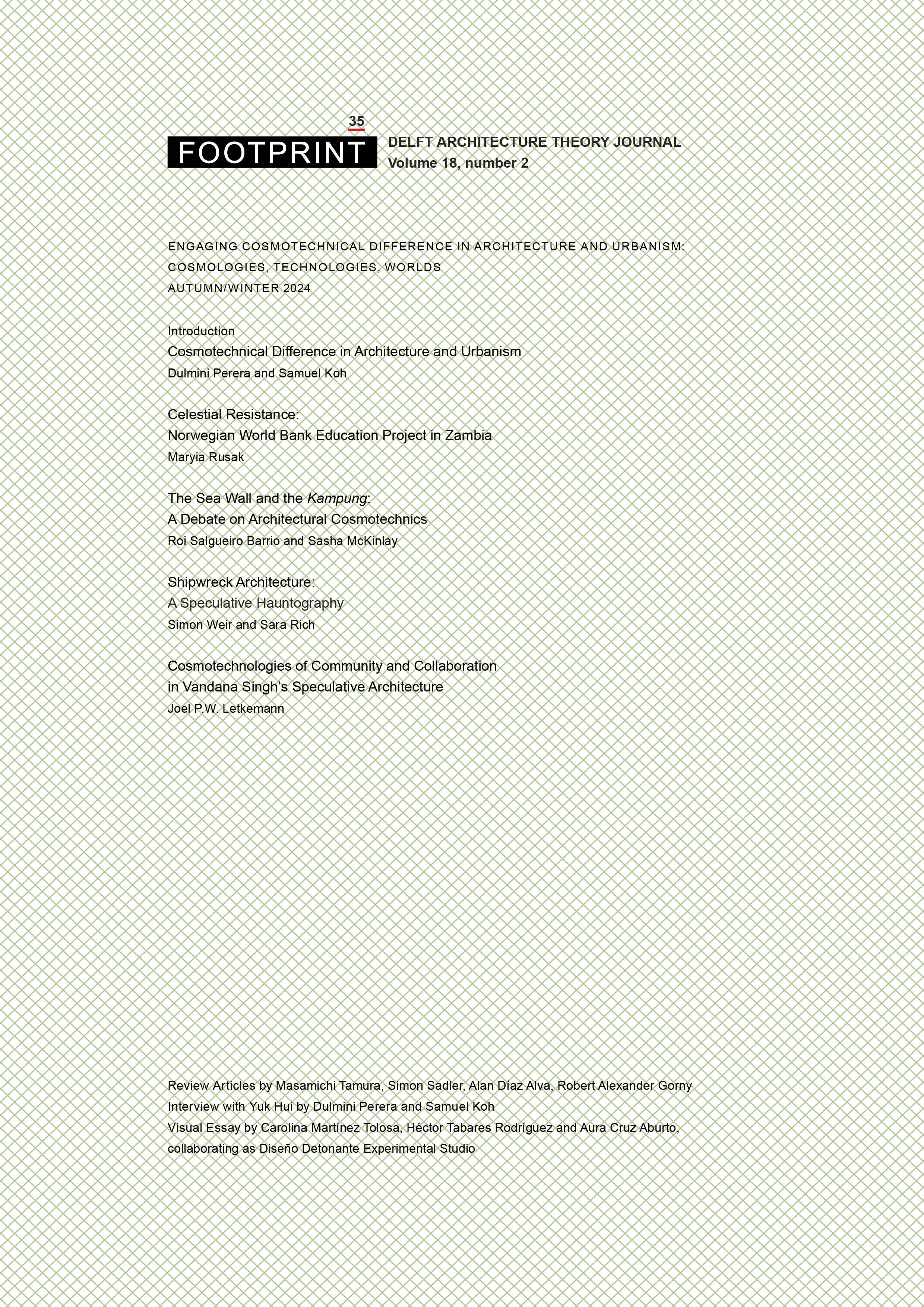Building with Jelly, or, Concrete as the Concretion of the Abstract
DOI:
https://doi.org/10.59490/footprint.18.2.7186Abstract
In his recent book titled *Béton: arme de construction massive du capitalisme*, Marxist thinker Anselm Jappe presents a critique of the emergence and ongoing centrality of reinforced concrete as a hegemonic building material. In this slim volume, Jappe traces its historical trajectory, analysing the economic pressures propelling its hegemonic consolidation, examining the central role it played in political projects of various stripes, and critiquing the social, cultural, and environmental consequences of the latter. What is interesting and novel about his contribution, however, is the conceptual framework deployed for this purpose. Unlike most Marxist critiques of architecture which usually focus on questions of class or ideology, Jappe focuses on matter and abstraction. Value-form theory (and the tradition of German *Wertkritik* which Jappe is part of), reads Marx’s theory of value as a theory of the abstract domination of human life and social practice by the abstract forms set in motion by the capitalist mode of production.
What I propose is to write a review of Jappe’s book which attempts to read it in conjunction with the question of cosmotechnics. One of Yuk Hui’s central concerns is the decline of technodiversity as a result of the globalisation of Western technological monoculture throughout capitalist modernity. As the call for contributions rightly points out, the fields of architecture and urbanism have not yet properly addressed their implication in this process. I argue that the homogenization of building practices and the unanimous popularity of reinforced concrete is a major aspect of this process which ought to be examined more closely.
While Hui’s project provides us with conceptual tools useful to critique this foreclosing of alternative cosmotechnics and to imagine how modern technologies could be rechannelled towards future divergent trajectories, he does not delve into the precise mechanisms through which this monoculture has been established in the first place. To explain this, I argue, Marxist theory is crucial. Expanding Jappe’s value-critical analysis of reinforced concrete with Moishe Postone’s account of how the peculiar social ‘self-mediating’ character of abstract labour in capitalism explains the transformation of labour into pure means and of its tools and products in mere objects, I intend to complement the question of cosmotechnics with an explanation of the decline of technodiversity grounded on the abstract logic of capital.
References
Chambers, Samuel A. There’s No Such Thing As ‘The Economy’: Essays on Capitalist Value. Earth: Punctum Books, 2018.
Forty, Adrian. Concrete and Culture: A Material History. London: Reaktion Books, 2012.
Franklin, Seb. The Digitally Disposed: Racial Capitalism and the Informatics of Value. Minneapolis: University of Minnesota Press, 2021, 197.
Hurst, Will. ‘Concrete: Do Architects Have Their Heads in the Sand?’ The Architects’ Journal (blog), 16 January 2019, https://www.architectsjournal.co.uk/news/concrete-do-architects-have-their-heads-in-the-sand.
Jappe, Anselm. ‘Towards a History of the Critique of Value’, Capitalism Nature Socialism 25, no. 2 (2014): 25–37.
Jappe, Anselm. Hormigón: Arma de Construcción Masiva Del Capitalismo, trans. Diego Luis Sanromán. Logroño: Pepitas de calabaza, 2021.
Larsen, Neil et al., eds. Marxism and the Critique of Value. Chicago: MCM’ Publishing, 2014.
Marx, Karl. Grundrisse: Foundations of the Critique of Political Economy, trans. Martin Nicolaus. London: Penguin Books, 1973.
Murray, Patrick. ‘Marx’s “Truly Social” Labour Theory of Value: Part I, Abstract Labour in Marxian Value Theory’, in The Mismeasure of Wealth: Essays on Marx and Social Form. Leiden: Brill, 2016, 120–55.
Ngai, Sianne. ‘Visceral Abstractions’, GLQ: A Journal of Lesbian and Gay Studies 21, no. 1 (2015): 33–63.
Postone, Moishe. Time, Labor, and Social Domination: A Reinterpretation of Marx’s Critical Theory. Cambridge: Cambridge University Press, 1993.
Potter, Brian. ‘There Will Soon Be More Concrete Than Biomass on Earth’ Heatmap, 8 March 2023, https://heatmap.news/economy/the-planet-s-jaw-dropping-astonishing-downright-shocking-amount-of-concrete.
Sutherland, Keston. ‘Marx in Jargon’, World Picture 1 (2008): 1–25.
Wang, Lei et al. ‘Overview of the Application of Ecological Concrete in Sponge City Construction’, Frontiers in Earth Science 10 (2022): 10–17, https://doi.org/10.3389/feart.2022.1085419
Watts, Jonathan. ‘Concrete: The Most Destructive Material on Earth’, The Guardian, 25 February 2019, https://www.theguardian.com/cities/2019/feb/25/concrete-the-most-destructive-material-on-earth
Downloads
Published
Issue
Section
License
Copyright (c) 2025 Alan Diaz

This work is licensed under a Creative Commons Attribution 4.0 International License.
- Authors retain copyright and grant the journal right of first publication with the work simultaneously licensed under a Creative Commons Attribution License that allows others to share the work with an acknowledgement of the work's authorship and initial publication in this journal.
- Authors are able to enter into separate, additional contractual arrangements for the non-exclusive distribution of the journal's published version of the work (e.g., post it to an institutional repository or publish it in a book), with an acknowledgement of its initial publication in this journal.





